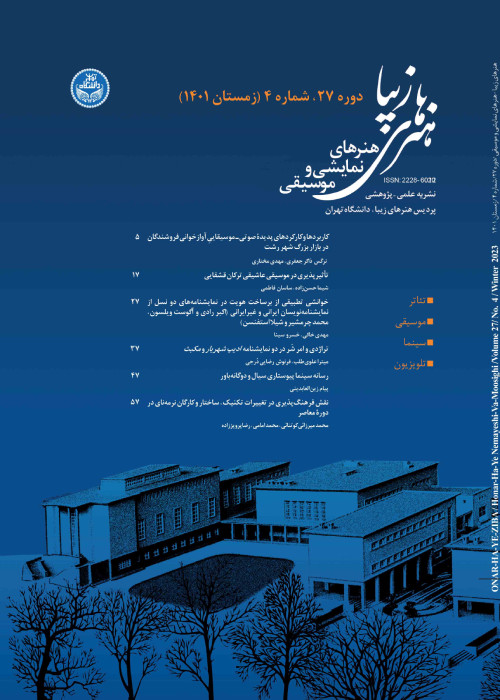The Influence of Gustav Mahler on the Composers of the Second Viennese School
Author(s):
Article Type:
Research/Original Article (دارای رتبه معتبر)
Abstract:
This article examines the works and the musical life of Gustav Mahler, the late-romantic Austrian composer, and his influence on composers such as Arnold Schoenberg, Anton Webern and Alban Berg. In the history of music, after the greats such as Haydn, Mozart and Beethoven who were active during the classical period in Vienna and are known as the Viennese School musicians, in the early 20th-century Vienna witnessed the rise of other significant composers such as Schoenberg and his students Webern and Berg, who because of the impact of their works and musical beliefs on the musical community, were later called the composers of the Second Viennese School. Aside from music, there are certain common aspects between this school and philosophy as well. The modern critical philosophy of the 20th century, namely the Frankfurt Philosophy School, is closely related to Theodor W. Adorno who was once Schoenberg’s student and this caused the Second Viennese School to become more widely-known in 20th century. This school, like other art schools, is connected to a historical chain in terms of development. Just as great composers such as Haydn, Beethoven, Wagner and Mahler are dependent upon the musical thoughts of their ancestors, the musicians of all generations need to adopt the experiences of the ones before them. This article will show in an analogical and adaptive manner how composers of the Second Viennese School followed Mahler’s thoughts regarding their dealing with musical elements such as texture, harmony, orchestration and other elements, and used his experiences in their own development of music. In order to reach credible and correct results in this research, the text has been divided into two segments. First segment is a review on the musical literature of the past and topics related to Mahler’s artistic life in order to clarify his musical aspects and his artistic imagination for the reader. Second segment involves the analogy between Mahler’s musical ideas and the Second Viennese School, presenting evidence. In this segment which can be considered to contain the main discussion material in this article, works of the three great composers of the Second Viennese School (Schoenberg, Webern and Berg) are compared and matched to Mahler’s musical ideas separately, and are discussed and examined thoroughly. We also examine some interesting points where we observe Mahler being influenced by these composers which is nothing new in the history of music. To name a few, we can consider Schoenberg’s Disfigured Night and Gurrelieder to have influenced Mahler’s harmonic point of view. However, Mahler’s Influence by far outweighs how much he was himself influenced, which is what motivated the authors of the article to explore this topic of interest. Mahler’s emotional support for this school and the inspiration caused by his works both contributed to the development of the fresh structure of the 20th century. In general, it is safe to say that the Second Viennese School and its composers are all consequences of Mahler’s rich music and his artistic thoughts.
Keywords:
Language:
Persian
Published:
Honar-Ha-Ye-Ziba: Honar-Ha-Ye Mosighi Va Namayeshi, Volume:23 Issue: 60, 2018
Pages:
5 to 16
magiran.com/p1916339
دانلود و مطالعه متن این مقاله با یکی از روشهای زیر امکان پذیر است:
اشتراک شخصی
با عضویت و پرداخت آنلاین حق اشتراک یکساله به مبلغ 1,390,000ريال میتوانید 70 عنوان مطلب دانلود کنید!
اشتراک سازمانی
به کتابخانه دانشگاه یا محل کار خود پیشنهاد کنید تا اشتراک سازمانی این پایگاه را برای دسترسی نامحدود همه کاربران به متن مطالب تهیه نمایند!
توجه!
- حق عضویت دریافتی صرف حمایت از نشریات عضو و نگهداری، تکمیل و توسعه مگیران میشود.
- پرداخت حق اشتراک و دانلود مقالات اجازه بازنشر آن در سایر رسانههای چاپی و دیجیتال را به کاربر نمیدهد.
In order to view content subscription is required
Personal subscription
Subscribe magiran.com for 70 € euros via PayPal and download 70 articles during a year.
Organization subscription
Please contact us to subscribe your university or library for unlimited access!


